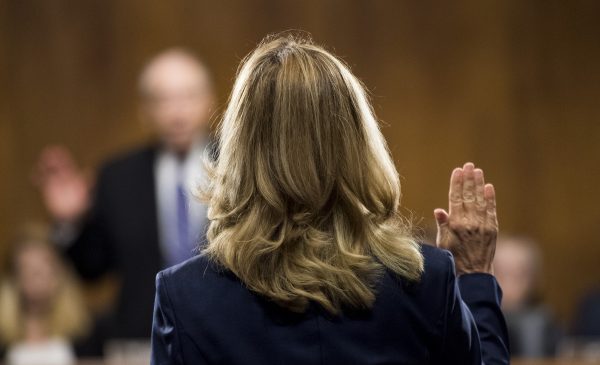
Christine Blasey Ford being sworn in before the Senate Judiciary Committee. Tribune Media
By Rachel Duckett
Contributor
Last month at a rally in Mississippi, President Donald Trump openly mocked Christine Blasey Ford, imitating her testimony before the Senate Judiciary Committee, where she bravely recalled her sexual assault at the hands of a high school aged Brett Kavanaugh.
Kavanaugh was nominated by Trump in July of 2018 to fill former Supreme Court Justice Kennedy’s chair. When Ford heard of the nomination, she sent a private letter to U.S Sen. Diane Feinstein of California in hopes that her experience would deem him unfit for the position.
Trump’s imitation of Ford was gross and wholly unpresidential, but after the crowd’s laughter died down, another part of his speech stuck out to me even more.
“Think of your son. Think of your husband,” said Trump.
Addressing women in the United States, Donald Trump, a man who has been accused of sexual assault by at least 22 women, tells us to think of our sons, and of our husbands. Essentially, this flips the narrative, telling a different story, one where the assailant is made out to be the victim.
I’ve seen this many times, where men hijack the conversation about sexual assault and turn it into a conversation about false rape accusations, sensationally equating the reach and gravity of the two issues. All good intentions aside, doing this is thoughtless, distracting and damaging to real victims. And isn’t it interesting how no one brings up their concern of false accusations until they can be used as a weapon against sexual assault survivors?
According to the National Sexual Violence Research Center, the prevalence of false reporting of sexual assault is between 2 and 10 percent. These numbers represent the percentage of cases reported and investigated by law enforcement, and found to be false. These numbers also have no way of accounting for an estimated 63 percent of sexual assault cases that are not reported at all. With 3 percent of men in the United States experiencing rape or attempted rape, the average man is more likely to be raped than to be falsely accused of rape.
So, while false rape allegations should be acknowledged, and male rape victims deserve to be heard, supported, and advocated for, this particular conversation is about women.
Our society has historically denied women ownership of their sexuality, resulting in a social climate that leaves us especially vulnerable to sexual violence.
It’s an indisputable fact that sexual violence is largely a female issue, but if it happens so often, why don’t they just report it? Good question.
In 2016, Brock Turner, a Stanford student with a great lawyer, was charged and convicted of raping an unconscious woman behind a dumpster and faced a potential 14 years in prison. Instead, he was sentenced just six months, and ultimately served only three of those months. We watch men like Trump and Kavanaugh, both accused of sexual assault by multiple women, become our president and our Supreme Court justice, and we have to ask ourselves, who are women supposed to report their assault to, and at what cost?
Victims of sexual assault routinely feel shame, blaming themselves for their experience. We teach young girls how NOT to get raped, as if it was a trap you fall into if you’re not paying attention, and not a violent crime, usually perpetrated by someone you know. It’s also important to understand the power dynamic involved when rich, powerful men abuse women in their industry.
Harvey Weinstein ruined the careers and credibility of a handful of talented women that he abused. Bill Cosby held the same power. When we watch these high profile cases, and see the president of the United States openly mock a victim, we see exactly why women don’t report.
Men watching movements like #MeToo unfold often come to the conclusion that these women must be lying, as it seems like nearly every woman has experienced sexual harassment of some kind, and how could that be true, right?
I’m here to tell you that if you cast away all prior images you have of hysterical women, and trustworthy men in suits, and just listened to the women around you, you might start to understand why women don’t always report. And if you find yourself more often empathizing with the accused, rather than the victim, you might want to re-evaluate.
|
If you or someone you know has been sexually assaulted, contact these resources for help: |
|

